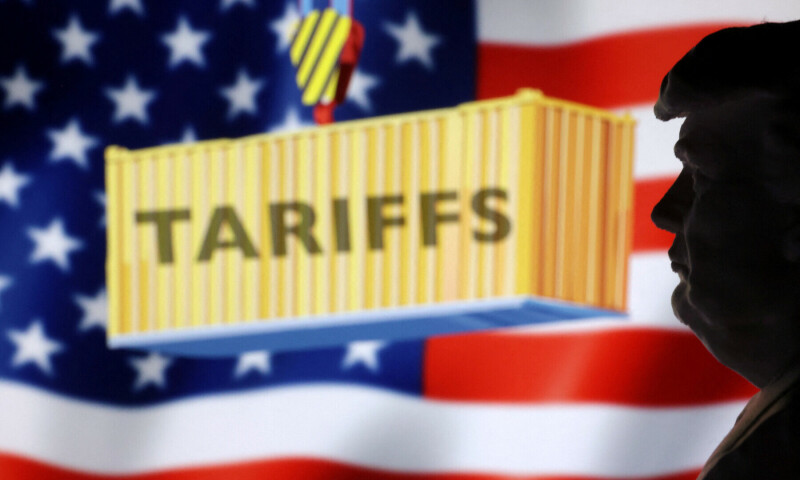

WASHINGTON: The US tariff exemption for package shipments valued under $800 ended on Friday, raising costs and disrupting supply chain models for e-commerce companies, small businesses using online marketplaces and consumers alike.
The US Customs and Border Protection agency began collecting normal duty rates on all global parcel imports, regardless of value, country of origin, or mode of transportation at 12:01am (0401 GMT) on Friday.
It offered a flat-rate duty option of $80 to $200 per package shipped from foreign postal agencies for six months.
The change broadens the Trump administration’s cancellation of the de minimis exemption for packages from China and Hong Kong in May as part of an effort to halt shipments of fentanyl and its precursor chemicals into the US.
Move disrupts supply chain models for e-commerce companies and small businesses
The de minimis tax exemption is a law that Congress passed on a bipartisan basis that allows shipments bound for American businesses and consumers valued under $800 (per person, per day) to enter the US free of duty and taxes. As it allows goods to be shipped quickly and affordably, it benefitted every American for decades though it gained much appreciation during the pandemic.
White House trade adviser Peter Navarro said, “President Trump’s ending of the deadly de minimis loophole will save thousands of American lives by restricting the flow of narcotics and other dangerous prohibited items, and add up to $10 billion a year in tariff revenues to our Treasury.”
A senior administration official said the change was permanent, adding that any push to restore the exemptions for trusted trading partner countries was “dead on arrival”.
The de minimis exemption has been in place since 1938, starting at $5 for gift imports and was raised from $200 to $800 in 2015 to foster small business growth on e-commerce marketplaces.
But direct shipments from China surged after President Trump raised tariffs on Chinese goods during his first term, creating a new direct-to-consumer business model for e-commerce firms Shein and Temu.
The National Coalition of Textile Organisations hailed a “historic win” for US manufacturing following the closing of a loophole that allowed foreign fast-fashion firms to avoid tariffs and import apparel sometimes made with forced labor, undercutting American jobs.
“The administrations executive action closes this channel and delivers long overdue relief to the US textile industry and its workers,” the group said. CBP has estimated that the number of packages claiming the de minimis exemption jumped nearly 10-fold from 139 million in fiscal 2015 to 1.36 billion in fiscal 2024, a rate of nearly four million per day.
Higher costs, more paperwork
However, retail analysts say that the end of de minimis is likely to raise prices for many goods sold through e-commerce companies as those that previously avoided tariffs because of the exemption will ultimately be charged duties.
This may put such firms on a par with costs for more established retailers like Walmart that tend to import merchandise in bulk containers that are subject to tariffs.
It is also likely to curb trade on peer-to-peer platforms, such as eBay and Etsy, used by small businesses to sell secondhand, vintage or handmade items. CBP has collected more than $492 million in additional duties on packages shipped from China and Hong Kong since their exemptions were eliminated on May 2, another Trump administration official said.
The official said that full tariff rates will apply to all packages shipped by express carriers such as FedEx, United Parcel Service and DHL. These companies are better set up to collect duties and process customs data than traditional postal agencies.
Foreign postal agencies can opt to collect and process the duties based on the value of the package contents, or opt for the flat rate method by collecting a flat tax based on Trump’s tariff rates currently in place on goods from the country of origin.
Based on latest CBP guidance, parcels would be charged $80 from countries with Trump-imposed duty rates below 16pc, such as Britain and the European Union, $160 from countries between 16pc and 25pc, such as Indonesia and Vietnam, and $200 from countries above 25pc, including Brazil, Canada, China and India.
But postal services must shift to full “ad valorem” duty collection based on the value of the shipments by Feb 28, 2026, the second official said. This official said some foreign postal services have suspended mail to the US but that the administration was working with foreign partners and the US Postal Service to minimize disruptions.
European postal groups, including Germany’s DHL and Norway’s Posten Bring, on Friday were seeking ways to handle the new fees and extra paperwork.
DHL has suspended shipments of standard parcels for businesses and Posten Bring paused shipments of packages under $800.
Published in Dawn, August 30th, 2025




